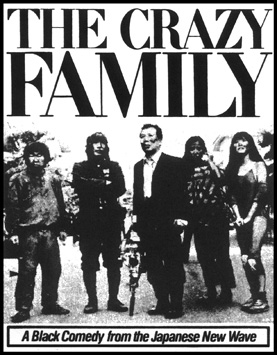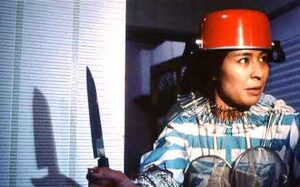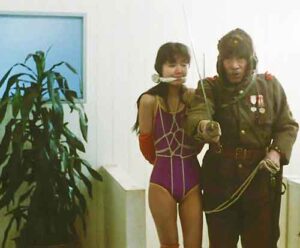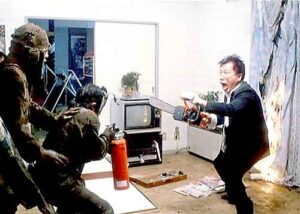A true classic of Japanese cult cinema, a stunningly twisted black comedy that takes on suburban life in eighties-era Japan by spoofing American sitcoms of the time. Think of it as FAMILY TIES re-imagined by David Cronenberg.
THE CRAZY FAMILY (1984) Trailer
Director Sogo Ishii has long been one of Japan’s wildest talents, from his early underground features CRAZY THUNDER ROAD and BURST CITY to subsequent bigger budgeted—but just as subversive—fare like ANGEL DUST and GOJOE. 1984’s CRAZY FAMILY (GYANKUFUSHA KAZOKU) has the distinction of being at once Ishii’s best known and most obscure film. It’s almost certainly his finest work: defiantly transgressive yet far more accessible than most of his other films. It has, unsurprisingly, proven quite influential and is widely credited with kicking off the Japanese cinema “New Wave” of the late eighties and early nineties, whose participants include such essential filmmakers as Shinya Tsukamoto (TETSUO) and Shozin Fukui (PINOCCHIO 964).
Unfortunately, THE CRAZY FAMILY has inexplicably vanished from circulation in recent years, though not due to disinterest on the part of horror/cult movie fans (I know of at least one internet “Search Party” dedicated to tracking it down). Its only recent appearance was on a poorly mastered, unsubtitled Japanese DVD, which is now out of print. Surely we can do better than that!
The Kobayashis are a typical middle class family in Japan: the middle aged Katsuya is a hard working career man, his wife Saeko a contented housewife, daughter Erika a practicing singer and son Masaki a dedicated overachiever. Their good fortune appears to be assured when they move into their dream home, an ultra-modern two story townhouse.
But things quickly take a turn for the twisted when Yasukune, Katsuya’s war veteran grandfather, moves in. Katsuya tears up the kitchen floor in order to build his grandpa a basement room, but loses his head when he discovers bugs nesting in the house’s foundations. Saeko, meanwhile, decides she’s fed with her society-imposed maternal role and takes to performing strip-teases for Grandpa’s lecherous buddies. Masaki becomes immersed in his schoolwork to the point of stabbing himself in the leg to stay awake and building weird electronic contraptions to help retain information, while Erika’s budding sexuality sprouts into full blown nymphomania. All the while Katsuya attempts to kill the bugs in his house in increasingly drastic ways, from poison to fire to brute force, eventually bursting a water pipe.
As his family’s collective behavior grows steadily unhinged, Katsuhiro decides to take drastic action: he boards up all the doors and windows and begs his family to poison themselves. This leads to an all-out five way battle, fought with any household appliance that happens to be at hand: pots and pans, kitchen knives, sharpened pencils, golf clubs, a potted cactus and a baseball bat to which the family dog is tied. The melee is (literally) explosive, but everybody survives, leading, believe it or not, to an honest-to-God happy ending.
Thematically, it’s not difficult to see what Sogo Ishii was trying to convey with this film: the protagonist Katsuhiro appears to represent the Japanese everyman torn between old (his grandfather) and new (his wife and kids) values, with his suburban home serving as the battleground. Then there’s the American TV comedy wraparound (substitute malevolence for gags in any eighties sitcom and you’ll have a good idea of this film’s gist), which in itself appears to be a critique, possibly of Western values encroaching upon Japan’s middle class.
Of course, such things need not concern modern viewers Japanese or otherwise, as the time period this film was critiquing is long past, and anyway its surface pleasures are more than adequate. Quite simply, it’s enough to simply bask in Ishii’s superbly orchestrated cavalcade of destruction.
Leaving both the hoary old school Japanese epics as well as the postmodern experiments of filmmakers like Nagisa Oshima (IN THE REALM OF THE SENSES) behind him, Ishii has fashioned an innovative and kinetic narrative that utilizes jump cuts, POV shots and sprightly handheld camerawork in a wildly effective yet totally unselfconscious manner, culminating in an amazing final shot that powerfully encapsulates all the film’s themes and provides a satisfying coda in a lengthy 360-degree pan. The hard rock score is another plus, harking back to Ishii’s seminal punk-tinged work but never overwhelming the action.
Vital Statistics
THE CRAZY FAMILY (GYAKUFUNSHA KAZOKU)
Art Theatre Guild
Director: Sogo Ishii
Producer: Banmei Takahashi
Screenplay: Sogo Ishii, Norio Kaminami
Cinematography: Masaki Tamura
Editing: Junuchi Kikuchi
Cast: Katsuya Kobayashi, Mitsuko Baisho, Youki Kudoh, Yoshiki Arizono, Hitoshi Veki, Kazuhiko Kishino, Toyoko Koumi, Akira Ogata, Iwao Hayashizaki, Nobuhiro Gomori, Yoshinori Inoue, Hiroma Takahashi, Kunihiro Ide, Alex Ablamov




